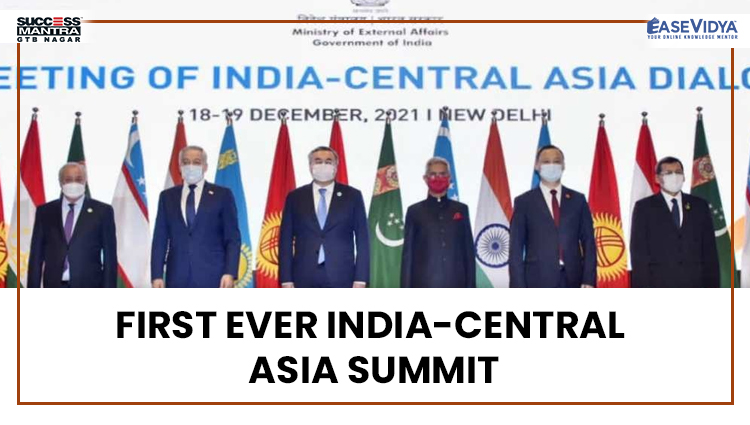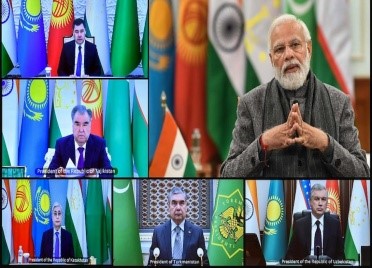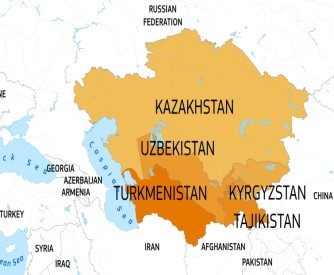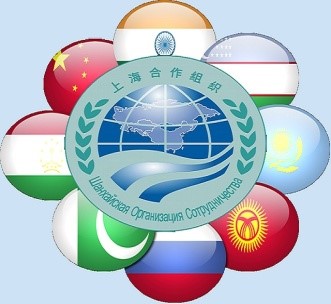
FIRST EVER INDIA-CENTRAL ASIA SUMMIT
FIRST EVER INDIA-CENTRAL ASIA SUMMIT
Prime Minister Narendra Modi hosted the first-ever India-Central Asia Summit virtually on January 27, 2022. It was attended by Presidents of the Republic of Kazakhstan, Kyrgyz Republic, Republic of Tajikistan, Turkmenistan and Republic of Uzbekistan. This first India-Central Asia coincided with the 30th anniversary of establishment of diplomatic relations between India and Central Asian countries. The summit came two days after a similar China-Central Asia Conference was held where China offered USD 500 million in assistance and pledged to ramp up trade to USD 70 billion from the present levels of about USD 40 billion a year.

Current Affairs Notes By Success Mantra Coaching Institute GTB Nagar Delhi CLICK HERE
ADOPTION OF DELHI DECLARATION
The joint declaration called upon other central Asian countries to consider joining the connectivity initiatives of India and Central Asian member nations such as the International North-South Transport Corridor (INSTC) and Ashgabat Agreement (a multimodal transport agreement between India, Pakistan, Kazakhstan, Uzbekistan, Turkmenistan, Iran and Oman). The leaders also supported India's proposal to include the Chabahar Port and Turkmenistan's proposal to include Turkmenbashi Port within the framework of the International North-South Transport Corridor (INSTC). The leaders also agreed on the need to continue large-scale and long-term economic cooperation between India and Central Asian countries to strengthen and expand inter-connectivity. The Turkmenistan President stressed on the importance of the TAPI gas pipeline project in the context of the same. The leaders further directed their Ministers to prepare a roadmap to enhance trade and industrial cooperation between India and the Central Asian countries and encouraged the India-Central Asia Business Council (ICABC) to accelerate their efforts to promote business linkages between the countries.
INDIA'S STAND ON CENTRAL ASIAN COUNTRIES
- Kazakhstan: It has become a vital partner for India’s energy security. India also expressed condolences for the recent loss of life and property in Kazakhstan.
- Uzbekistan: India’s state governments are also active partners in its growing cooperation with Uzbekistan.
- Tajikistan: Both the countries have a longstanding cooperation in the field of security.
- Turkmenistan: It is an important part of Indian vision in the field of regional connectivity, which is evident from participation in the Ashgabat Agreement. Regional connectivity in Central Asia is a key arm of the 2018 Ashgabat Agreement.

PRAVAHINI Current Affairs Notes By Success Mantra Coaching Institute GTB Nagar Delhi CLICK HERE
INDIA-CENTRAL ASIA DIALOGUE
It is a ministerial-level dialogue between India and the Central Asian countries namely Kazakhstan, Kyrgyzstan, Tajikistan, Turkmenistan and Uzbekistan. All five nations became independent states after the collapse of the USSR in 1991, post-Cold war. All the countries participating in the dialogue, except for Turkmenistan, are also members of the SCO. The dialogue focuses on a number of issues including ways to improve connectivity and stabilise war-ravaged Afghanistan.
SIGNIFICANCE OF THE SUMMIT FOR INDIA
The summit is symbolic of the importance attached by the leaders of India and the Central Asian countries to a comprehensive and enduring India-Central Asia partnership. It is being held at a critical juncture when tensions between the West and Russia and the United States (US) and China are rising. India too has faced geopolitical setbacks: Border tensions with China and the Taliban takeover of Afghanistan. It follows President Vladimir Putin’s visit to India, which may have allowed India to push Russia to moderately balance China in Eurasia and to contain the threats from Afghanistan. The recent unrest in Kazakhstan also showed that “new actors” are vying for influence in the region though their motives are still not clear.
SHANGHAI COOPERATION ORGANISATION (SCO)
SCO is a permanent intergovernmental international organization. It’s a Eurasian political, economic and military organization aiming to maintain peace, security and stability in the region. It was created in 2001. The SCO Charter was signed in 2002, and entered into force in 2003. It is a statutory document which outlines the organization’s goals and principles, as well as its structure and core activities. The SCO's official languages are Russian and Chinese. Prior to the creation of SCO in 2001, Kazakhstan, China, Kyrgyzstan, Russia and Tajikistan were members of the Shanghai Five. Shanghai Five (1996) emerged from a series of border demarcation and demilitarization talks which the four former Soviet republics held with China to ensure stability along the borders. Following the accession of Uzbekistan to the organization in 2001, the Shanghai five was renamed the SCO. India and Pakistan became members in 2017.

RELATED: INDIA-ISRAEL 30 YEARS OF DIPLOMATIC RELATION
To mark the 30th anniversary of the establishment of diplomatic ties between the two countries, India and Israel launched a commemorative logo. The logo features the Star of David and the AshokaChakra- the two symbols that adorn the national flags of both countries- and forms the numeral 30 depicting the 30th anniversary of bilateral relations.
DIPLOMATIC TIES B/W INDIA & ISRAEL
Though India officially recognised Israel in 1950, the two countries established full diplomatic ties only on 29th January 1992. As of December 2020, India was among 164 United Nations (UN) member states to have diplomatic ties with Israel.
Economic and Commercial Relations: From USD 200 million in 1992, bilateral merchandise trade stood at USD 4.14 billion (excluding defence) during the period April 2020 – February 2021 with the balance of trade being in India’s favour.
Trade in diamonds constitutes about 50% of bilateral trade. India is Israel's third-largest trade partner in Asia and seventh largest globally. Israeli companies have invested in India in energy, renewable energy, telecom, real estate, water technologies, and are focusing on setting up R&D centers or production units in India. India is also in dialogue with Israel for concluding a Free Trade Agreement (FTA).
Defence: India is the largest buyer of military equipment from Israel, which, in turn, is the second-largest defence supplier to India, after Russia. The Indian armed forces have inducted a wide array of Israeli weapon systems over the years, which range from Phalcon AWACS (Airborne Warning And Control Systems) and Heron, Searcher-II and Harop drones to Barak anti-missile defence systems and Spyder quick-reaction anti-aircraft missile systems. The acquisitions also include a host of Israeli missiles and precision-guided munitions, from Python and Derby air-to-air missiles to Crystal Maze and Spice-2000 bombs. At the 15th Joint Working Group (JWG 2021) meeting on Bilateral Defence Cooperation, countries agreed to form a Task Force to formulate a comprehensive Ten-Year Roadmap to identify new areas of cooperation.
COOPERATION IN AGRICULTURE
- In May 2021, “a three-year work program agreement” for development in agriculture cooperation, was signed. The programme aims to grow existing Centres of Excellence, establish new centers, increase CoE’s value chain, bring the Centres of Excellence into the self-sufficient mode, and encourage private sector companies and collaboration.
- Science & Technology: Recently, experts from India and Israel deliberated on widening the scope of India-Israel Industrial R&D and Technological Innovation Fund (I4F) at its 8th Governing Body meeting. They approved 3 joint R&D projects worth 5.5 million USD and suggested measures to create a broader India-Israel collaborative ecosystem. I4F is a cooperation between the two countries to promote, facilitate and support joint industrial R&D projects between companies from India and Israel to address the challenges in the agreed ‘Focus Sectors’.
- Others: Israel is also joining the India-led International Solar Alliance (ISA), which aligns very well with the objectives of both countries to scale up their cooperation in renewable energy and partner in clean energy.
TEST YOURSELF
Q.1 Which of the following countries have hosted the first-ever India-Central Asia Summit virtually which was also attended by 5 Central Asian Nations?
- Uzbekistan
- India: ANSWER
- Kazakhstan
- None of the above
Q.2 Which of the following Nations is an important part of Indian vision in the field of regional connectivity, which is evident from participation in the Ashgabat Agreement?
- Turkmenistan: ANSWER
- Tajikistan
- Kazakhstan
- None of the following
Q.3 Prior to the creation of Shanghai Cooperation Organization (SCO), 5 nations were members of the Shanghai Five. Which of the following is not one of them?
- China
- Kazakhstan
- Russia
- India: ANSWER
Q.4 The 21st meeting of the SCO (Shanghai Cooperation Organization) Council of Heads of State was held in __________ in a hybrid format?
- Tehran, Iran
- Tashkent, Uzbekistan
- Shanghai, China
- Dushanbe, Tajikistan: ANSWER
Q.5 Kazakhstan which is the world’s largest landlocked country, bigger than the whole of Western Europe is sandwiched between which of the following two countries?
- India & China
- Russia & China: ANSWER
- China & North Korea
- None of the above












0 Comment